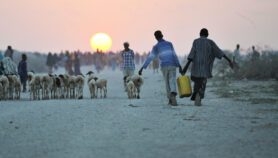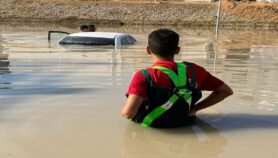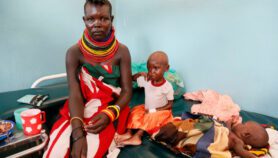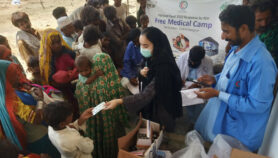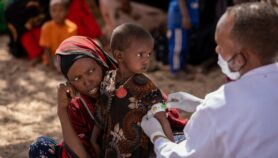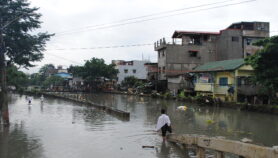Send to a friend
The details you provide on this page will not be used to send unsolicited email, and will not be sold to a 3rd party. See privacy policy.
Below is a round up of news from or about South Asia for the period 1–15 January 2008.
Tsunami stress disorders still affect Sri Lankans
Post-traumatic stress disorders continue to persist in many Sri Lankan adults affected by the Asian tsunami of 2004. A study in the British Journal of Psychiatry reports the need for accurate data about the risk of, and resilience to, impairing symptoms more than one year after disasters, in order to develop surveillance and interventions. More>>
Home-treatment of pneumonia effective for kids
Treating children with severe pneumonia at home is as effective as treating them in hospitals, according to a study by scientists from Pakistan, the United States and the WHO. The study, reported in The Lancet, could change treatment methods in poor settings. More>>
Study finds more trachoma-causing bacteria
Trachoma, an infectious disease that causes blindness, can be caused by more than one bacteria, a study in Nepal shows. The authors, reporting in PLoS Medicine, found that two bacteria other than Chlamydia trachomatis can cause the disease that affects six million people living in crowded, unhygienic conditions in developing countries. More>>
Cyclone Sidr ‘the result of climate change’
Cyclone Sidr, which devastated the Bangladesh coast in November 2007, could be the product of climate change, says Rashed Chowdhury, a scientist at the Pacific ENSO Applications Centre in Hawaii. Increased frequency if extreme weather events are linked to climate change, Chowdhury writes in the Daily Star. More>>
Multiple dengue virus types from India
A 2006 outbreak of dengue in Delhi, India, consisted of all four types of dengue virus at the same time. Researchers, reporting in Virology Journal, say this is the first time concurrent dengue infections have been reported from India and makes the country "hyperendemic" for the infection. More>>
Indian scientists identify leishmaniasis drug resistance protein
Scientists in India have identified a novel protein with a role in drug resistance in the membrane of Leishmania parasites. The protein is one of a group that transports a variety of molecules, including drugs, across cell membranes. The scientists, reporting in Molecular and Biochemical Parasitology, say drug resistance in Leishmania parasites is rising in developing countries. More>>
No data on arsenic-related diseases in Bangladesh
Bangladesh still does not have data on the magnitude of arsenic-related diseases, says arsenic expert Mahmuder Rahman. In an interview with the WHO Bulletin, Raham says that 12 years after the scale of the arsenic poisoning disaster in Bangladesh was first revealed, millions of people are still drinking contaminated water. More>>
Shrub offers new leads for leishmaniasis treatment
An extract from a climbing shrub sinensis could offer potential drug molecules against Leishmania donovani, the parasite that causes leishmaniasis. Studies by the Central Drug Research Institute in India, reported in Parasitology Research, demonstrate the anti-leishmanial activity of the extract. More>>
Bangladesh gets first biomass plant
Bangladesh’s first advanced biomass plant to generate electricity for rural areas, using rice husk, has opened for business. The 250 kilowatt plant is located in the town of Kapashia in Gazipur district, which was previously without electricity. It is part of a rural electrification project that aims to reach about 700,000 citizens through renewable energy. More>>
Bangladesh atomic energy commission to test for pesticides
The Bangladesh Atomic Energy Commission will help the country’s department of fisheries to test for residues of pesticides and heavy metals in aquaculture farms and water. The two agencies have signed an agreement of mutual cooperation. More>>
Pine needle gel absorbs iron
A gel made from pine needles can help adsorb iron and nitrates from industrial wastewaters. Studies by the Shimla-based Himachal Pradesh University in India, reported in Bioresource Technology, indicate that the biodegradable gels could be used to remove harmful ions from waters. More>>
Biodegradable plastic from industrial wastewaters
The wastewaters from the dairy and food processing industry, previously discarded, could find use in the production of a biodegradable plastic. Researchers from the India-based National Environmental Engineering Research Institute have developed the plastic from sludge generated from a combined dairy and food processing industry wastewater treatment plant. More>>
Dolphin, whale species from Pakistan
A Pakistani-UK team of scientists have identified 12 species of marine dolphins and whales off the coast of Pakistan. The study, whose first phase ends in September 2008, is the first to record information on the species in the area. More>>






